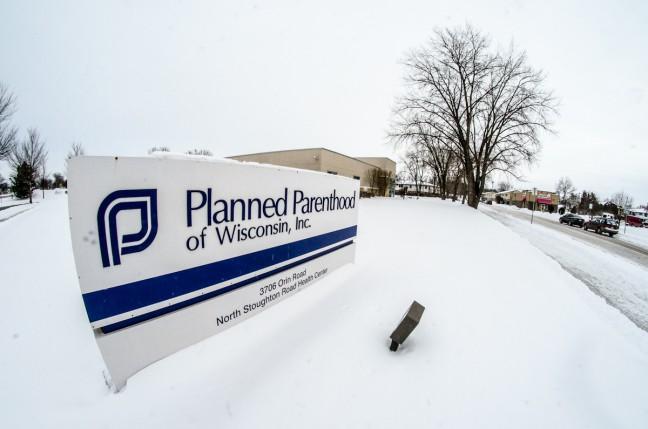[media-credit name=’MATTHEW KUTZ/Herald photo’ align=’alignnone’ width=’648′] [/media-credit]As the State Street crowd turned suddenly riotous early Sunday morning, police resorted to the use of pepper spray to quell the horde of Halloween revelers for the fourth year in a row.
[/media-credit]As the State Street crowd turned suddenly riotous early Sunday morning, police resorted to the use of pepper spray to quell the horde of Halloween revelers for the fourth year in a row.
Madison's Halloween tradition is now in jeopardy, as indicated by a release Sunday from Madison Mayor Dave Cieslewicz and Police Chief Noble Wray, which raised serious questions about the future of the event.
Discussions to cancel the event or limit it are expected to ensue over the course of next year.
"I was proud of the officers' and commanders' execution of the comprehensive plan," Wray said. "Although we have plans in place, for the fourth year in a row we have people coming to State Street to cause disruption and put my officer's safety at risk."
Officers clad in riot gear met a relatively small portion of the 100,000-person crowd jumping around and chanting "We want tear gas," "Ole ole ole" and more on the 500 block of State Street.
In response, police released pepper spray as the crowd thickened and projectiles were thrown at officers on horseback.
Ald. Mike Verveer, District 4, who was at the police command post during the disturbance, said the command for officers to put on their riot gear came at 1:52 am post daylight savings time and the command to unleash the spray came at 2:08 am.
"The number one concern for the Madison Police Department was the safety of the officers," Verveer said. "When the crowd is jumping up and down chanting things like 'USA! USA!' and the soccer chant 'Ole! Ole! Ole!' and 'We want tear gas,' you know that is a bad omen for the cops. I don't know what we can do with the jerks that are hell-bent on picking fights with police."
University of Wisconsin Interim Dean of Students Lori Berquam, an onlooker during the event both Friday and Saturday, said she heard partygoers talking about rioting on Saturday and the mentality of the mob still confuses her.
"What I don't get is why people have to act like that," Berquam said. "I don't know why revelers would walk right up to the police and ask to be pepper sprayed like that. They just continued to go at a line of police who were fully armed."
Berquam said except for the discouraging ending on State Street, the event went as planned.
"Friday was much friendlier. It was very low key," Berquam said. "In general it seemed like the people on State Street weren't overly intoxicated and the police did a nice job both nights."
Police made 447 total arrests, 178 on Friday and 269 on Saturday, according to the release. Verveer however said the nature of most arrests is somewhat encouraging for UW and the future of the event.
"The overwhelming majority of the infractions committed by revelers were open intoxicants and underage drinking," he said. "Trailing far behind were disorderly conduct, violation of the glass ban and public urination — there were a few resisting an officer, battery and drug arrests as well."
Anecdotally, Verveer added he heard the majority of the arrests were for people from out of town.
George Twigg, communications director for the mayor, said UW students were likely a minority among destructive revelers and only a small percentage of arrested individuals.
"In past years, UW students have always been about ten percent of the total arrests," Twigg said. "We know that the group causing the problem is not really UW students."
Berquam insisted the event for Madison, in some regards, was successful after no deaths or major property damages were reported. She added the successful work among law enforcement, UW and city businesses was commendable.
Berquam said she walked through the southeastern residence halls over the weekend and was impressed by the stability of the dorms.
"The residence halls were really quiet for the most part," she said. "Nothing was messed up. Nobody had to worry about some stranger sleeping in their den or in their bed … while residents may have been upset their friends could not visit, I still consider the policy a success."
While UW officials support their non-visitor policies in residence halls, Verveer said the Madison Fire Department received one-third fewer emergency calls compared to last year.
"Even though they used pepper spray this year, from my perspective it seems like they used less," he said. "Only a small percentage of the near-record crowds were among those who caused problems."
But the mayor was not impressed by the amount of people who flocked to the streets both Friday night and Saturday night. In a release, he said he viewed the numbers on State Street as a failure of the city's goal to reduce the crowd.
"[W]hen we spend approximately $350,000, when 447 people are arrested, when detox is filled, we can't characterize this as a successful event," Cieslewicz said.
Looking forward, Verveer predicted the city is in for another year of quarreling on both sides of the Halloween argument.
"The mayor has never been a fan of Halloween on State Street," Verveer said. "Barring a swell of support otherwise from my constituents, I will oppose any attempt by the mayor to cancel Madison's long Halloween tradition."







